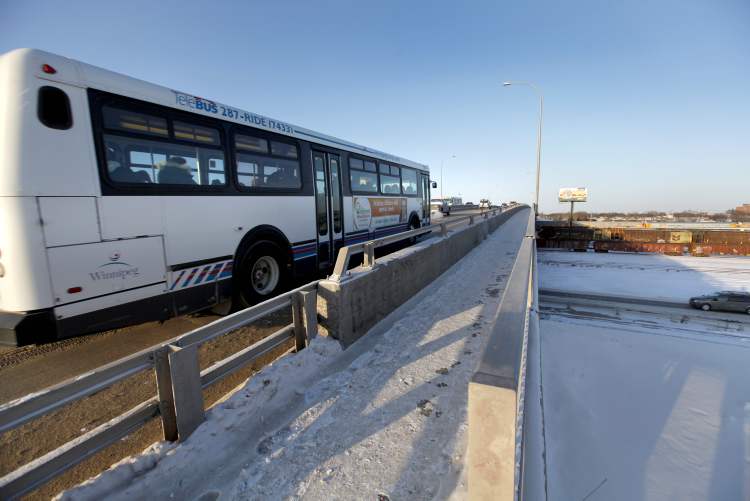Premier pans transit-fare hike
-- Says other ways to pay for rapid transit -- Mayor rejects tax-increment financing plan
Advertisement
Read this article for free:
or
Already have an account? Log in here »
To continue reading, please subscribe:
Monthly Digital Subscription
$1 per week for 24 weeks*
- Enjoy unlimited reading on winnipegfreepress.com
- Read the E-Edition, our digital replica newspaper
- Access News Break, our award-winning app
- Play interactive puzzles
*Billed as $4.00 plus GST every four weeks. After 24 weeks, price increases to the regular rate of $19.95 plus GST every four weeks. Offer available to new and qualified returning subscribers only. Cancel any time.
Monthly Digital Subscription
$4.99/week*
- Enjoy unlimited reading on winnipegfreepress.com
- Read the E-Edition, our digital replica newspaper
- Access News Break, our award-winning app
- Play interactive puzzles
*Billed as $19.95 plus GST every four weeks. Cancel any time.
To continue reading, please subscribe:
Add Free Press access to your Brandon Sun subscription for only an additional
$1 for the first 4 weeks*
*Your next subscription payment will increase by $1.00 and you will be charged $16.99 plus GST for four weeks. After four weeks, your payment will increase to $23.99 plus GST every four weeks.
Read unlimited articles for free today:
or
Already have an account? Log in here »
Hey there, time traveller!
This article was published 23/02/2012 (5083 days ago), so information in it may no longer be current.
Premier Greg Selinger has all but vowed to prevent the City of Winnipeg from raising bus fares another 20 cents this June, but transit users may not want to celebrate just yet.
The premier and Mayor Sam Katz remain divided on a means of financing any future rapid-transit construction, even as city and provincial officials work behind the scenes to find a solution to the latest transit impasse.
Late last year, city council voted to raise Winnipeg Transit fares 20 cents this June, on top of a five-cent increase that went into effect on Jan. 1, in an effort to raise approximately $6 million a year to pay for rapid-transit corridors such as the second phase of the southwest corridor.

The $138-million first phase, a dedicated bus corridor that runs from Queen Elizabeth Way to Jubilee Avenue, is slated to open April 8. Building the second phase comes with a $275-million price tag, while upgrading the entire corridor to light rail would cost approximately $700 million, according to the city’s Transportation Master Plan.
On Wednesday, Selinger said the second phase could soon proceed if the city agreed to a tax-increment financing plan that would see new property taxes from future developments alongside the corridor cover the cost.
“We think there’s a way to move forward on rapid transit now,” Selinger said in an interview, identifying tax-increment financing, or TIF, as a solution.
Population growth in Winnipeg will assure the need for more housing and the tax dollars new apartments and condos will generate, suggested Selinger, insisting his government will not accede to any transit-funding deal that would see transit users bear the brunt of rapid-transit costs.
“We’re not agreeing to the higher fare,” said the premier, whose government has a say in bus fares due to the nature of a transit cost-sharing agreement between the two governments. “The challenge is for us all to come up with a solution that doesn’t ding the folks who are among the least able to afford it.”
Katz, however, said the province must find a more tangible means to pay for transit corridors than tax-increment financing, which both governments are relying upon to recoup the cost of the first phase of the southwest corridor. The city and province have already borrowed a combined $90 million to pay for the corridor. Ottawa provided $17 million worth of seed money for Phase 1.
To pay for Phase 2, Katz said the province must identify some means of replacing the $6 million a year the city would raise from a fare hike — and then also bring money of its own to the table. Ottawa needs to be involved again as well, Katz said.
“The term TIF is thrown out there, but that’s not something that can realistically accommodate this. You need to identify those monies long before it happens, because it’s a long process,” Katz told reporters following Wednesday’s council meeting. “Sooner or later, the money has to be identified.”
Katz said he has raised seven ideas for replacing the cash with the province. A GST rebate would do the trick, said the mayor, adding he met with Selinger about this issue two weeks ago.
The premier said the two leaders chatted informally about rapid transit but certainly not in the detail suggested by the mayor. Selinger said officials from both sides are working diligently behind the scenes to reach an agreement, even to the point of deciding what route the second phase of the southwest corridor should take: alongside Pembina Highway, or in a dogleg through Fort Garry residential neighbourhoods.
“I am not going to micromanage this process,” Selinger said.
Katz, however, said the city and province must reach some form of deal by the first week of April in order to avert the transit-fare hike. But it’s unlikely the city would go through with a hike and raise funds for a new rapid-transit corridor without a provincial partner in place.
On the floor of council, Katz took heat from left-of-centre councillors Jenny Gerbasi (Fort Rouge), Ross Eadie (Mynarski) and Harvey Smith (Daniel McIntyre) regarding the proposed fare hike.
On March 21, council will consider a Smith-sponsored motion to rescind the fare-hike proposal.
bartley.kives@freepress.mb.ca


